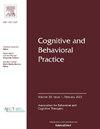Utilizing in Vivo and Imaginal Exposure in the Context of MDMA-Assisted Therapy for Social Anxiety Disorder: A Case Report
IF 2.9
3区 心理学
Q1 PSYCHOLOGY, CLINICAL
引用次数: 0
Abstract
This case report describes the application of in vivo and imaginal exposure techniques within MDMA-assisted therapy (MDMA-AT) for social anxiety disorder (SAD). The treatment, conducted as part of a randomized controlled trial, consisted of three nondrug preparation sessions, two drug sessions, and six nondrug integration sessions. Exposure interventions included imaginal exposure to shame-related memories during MDMA sessions, in vivo social exposures during MDMA sessions, imagery rescripting exercises during integration sessions, and social activation homework between sessions. The participant, a man in his late 30s with generalized SAD, showed significant reduction in symptoms and functional impairment as measured by the Leibowitz Social Anxiety Scale and Sheehan Disability Scale. Qualitative reports indicated increased social engagement, reduced anxiety in social situations, and a shift towards more self-compassion. The participant found both imaginal and in vivo exposures during MDMA sessions particularly impactful, reporting they allowed him to access intrinsic desires for social connection and performance that were previously masked by anxiety. This case suggests MDMA-AT incorporating exposure techniques may be a promising treatment for SAD, warranting further research.
在mdma辅助治疗的背景下,利用体内和想象暴露治疗社交焦虑障碍:一例报告
本病例报告描述了在mdma辅助治疗(MDMA-AT)中对社交焦虑症(SAD)的体内和成像暴露技术的应用。该治疗作为随机对照试验的一部分进行,包括三个非药物准备阶段,两个药物阶段和六个非药物整合阶段。暴露干预包括在MDMA期间对羞耻相关记忆的想象暴露,在MDMA期间的体内社会暴露,在整合期间的图像重新描述练习,以及在会话之间的社会激活作业。参与者是一名30多岁、患有广泛性SAD的男性,通过莱博维茨社交焦虑量表和希恩残疾量表测量,他的症状和功能障碍明显减轻。定性报告表明,他们增加了社交参与度,减少了社交场合的焦虑,并转向更多的自我同情。参与者发现在MDMA会议期间的想象和体内暴露都特别有影响,报告说它们允许他访问以前被焦虑掩盖的社会联系和表现的内在欲望。本病例提示MDMA-AT结合暴露技术可能是一种有希望的SAD治疗方法,值得进一步研究。
本文章由计算机程序翻译,如有差异,请以英文原文为准。
求助全文
约1分钟内获得全文
求助全文
来源期刊

Cognitive and Behavioral Practice
PSYCHOLOGY, CLINICAL-
CiteScore
4.80
自引率
3.40%
发文量
118
审稿时长
84 days
期刊介绍:
Cognitive and Behavioral Practice is a quarterly international journal that serves an enduring resource for empirically informed methods of clinical practice. Its mission is to bridge the gap between published research and the actual clinical practice of cognitive behavior therapy. Cognitive and Behavioral Practice publishes clinically rich accounts of innovative assessment and diagnostic and therapeutic procedures that are clearly grounded in empirical research. A focus on application and implementation of procedures is maintained.
 求助内容:
求助内容: 应助结果提醒方式:
应助结果提醒方式:


